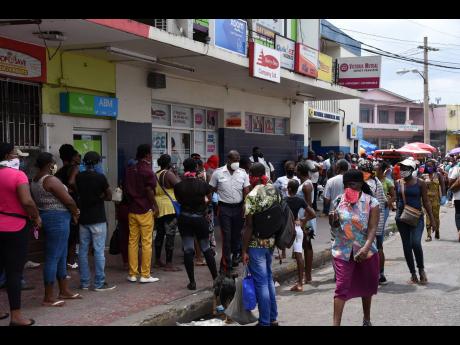Ransford Smith | Remittances and development: making silk purse out of sow’s ear?
The World Bank periodically publishes data on global remittances as does the Bank of Jamaica in regard to Jamaica. As well, we are frequently reminded of the importance of remittances to Jamaica’s economy by Government and other political leaders, by titans of industry and commerce, and by spokespersons within the diaspora community.
In its brief on global remittances for the year 2023, the World Bank provides data on remittances as a proportion of GDP for countries around the world. Remittances as a proportion of GDP is probably the most accurate index of the reliance of a country on remittances for economic well-being, stability – or survival!
Jamaica, with a remittance to GDP ratio of 18.9 per cent in 2023, is 17th on this list of countries. Across the world, other countries joining Jamaica in the top 20 – in order of their reliance on remittances – are Tonga, Tajikistan, Lebanon, Samoa, Nicaragua, Nepal, Honduras, El Salvador, The Gambia, Kyrgyz Republic, Lesotho, Comoros, the Yemen Republic, Haiti, Guatemala, West Bank and Gaza, Jamaica, Liberia, Kosovo, South Sudan, Honduras, El Salvador, Lesotho, Comoros, the Kyrgyz Republic, West Bank and Gaza, Jamaica, Guatemala, Kosovo, Uzbekistan, Haiti, Vanuatu, Georgia.
It is more than puzzling that one could look at a list such as this, which comprises some of the poorest countries in the world, at least eight of which are on the United Nations list of least developed nations, and a number of others that are currently, or were recently, wracked by civil war, or are war-torn, and not be prompted to pause and reflect on the role of remittances in development.
To put matters bluntly, an elevated level of remittances, not in absolute terms, but in relation to a country’s population size, and certainly as a proportion of a country’s gross domestic product (GDP), speaks not to economic well-being, but to economic need and even to impoverishment. In large measure, remittance levels appear to be a fairly accurate index of immiseration.
NOT MEANT AS AN ATTACK
To say this is not meant as an attack on remittances or on the many millions globally or in Jamaica’s case, the hundreds of thousands of our compatriots who work and sacrifice to make substantial financial transfers to their families and relatives at home. This sacrifice was, perhaps, best demonstrated by developments during the COVID-19 pandemic. The conventional wisdom was that as global trade and finance contracted, remittance flows would fall. But this did not happen. The Inter-American Development Bank’s Research Department was to note that during the pandemic, remittances to the countries of Latin America and the Caribbean “rose unexpectedly by over nine per cent in 2020 and went on to tally double-digit growth in both 2021 and 202”. According to the Bank of Jamaica, during the three-year period, 2020-2022, that is, at the height of the pandemic, in Jamaica’s case, remittances actually rose by 41 per cent, from US$ 2.4 billion to US$3.4 billion. While there is no single explanation for this occurrence, one that is obvious is the high degree of commitment and solidarity on the part of those making remittances: Jamaicans abroad evidently sought to do as much as they could to ease the social and economic burden the pandemic was causing their families and relatives at home.
Thus, the argument is not that remittances do not play an important role. Especially in Jamaica’s case, at the macroeconomic level, remittances make a decisive contribution to foreign-exchange reserves, to enhancing debt sustainability, and to creditworthiness. Nonetheless, much less commented on are the potential macroeconomic downsides inherent in excessive remittance dependency.
Among the most frequently cited, though in relation to Jamaica not an uncontested postulate, is that being unrequited transfers – gifts – which boost aggregate demand, remittances may induce inflation and may also contribute to real exchange rate appreciation thus undermining export competitiveness. In Jamaica’s case, the more likely consequence is that given the country’s propensity to consume and import, ample remittance inflows merely deepen these tendencies and do so without significant impact on domestic output. This excessive dependency can also have deleterious labour-market consequences.
A high level of inflow of remittances will raise the reservation price of labour and may further undermine domestic output by prompting withdrawal from or reduced participation in the labour force. It may not be surprising therefore that the literature is broadly ambivalent on the strength of the empirical connection between remittance inflows and GDP growth. In short, what seems to be required is a more nuanced discussion and understanding of the impact of remittances and, indeed, recognition that there are pernicious aspects to a high level of reliance thereon that may be ignored at the country’s peril.
UNOFFICIAL SAFETY NET
This is even moreso the case because there are considerations beyond the macroeconomy that invite comment. Remittances function as an unofficial safety net, mainly providing disposable income for improved access to goods and services and providing some measure of command over basic necessities – food, shelter, healthcare, education - for thousands of poor and working-class Jamaicans. It is probably not an exaggeration to say that across the global south, remittances help to let incompetent, and uncaring governments, or those merely operating within severe fiscal constraints, off the hook! Behind remittances are real people.
In Jamaica’s case, they are mostly young and ambitious, trainable or trained, and they crave social and economic mobility. Their decamping to metropolitan capitals is evidently also in the nature of a social and political safety valve for a high-volume sending country such as Jamaica. One might even speculate that this contributes in some measure to domestic social and political passivity – as dissatisfied citizens vote with their feet rather than engage assertively in civic and political life. A study published by the IMF almost two decades ago drew attention to what it described as the negative ‘political economy’ effect and moral hazard associated with remittances. It noted: “Individuals who are frustrated with the lack of opportunities at home migrate, rather than becoming politically active, and send remittances back to support those who stay behind. Those who remain also lack the incentive to put pressure on Government to reform because remittances partly compensate them for the negative consequences of government policy. Therefore, the country persists in a state characterised by low growth, poor economic policy, and high remittances.”
Tomorrow: The second part of this article looks into how remittances cost human capital.
Ransford Smith was Jamaica’s ambassador to the World Trade Organization. In the 1990’s, he was permanent secretary in the Ministry of Industry, Investment and Commerce and subsequently, Commonwealth Deputy Secretary General. Send feedback to columns@gleanerjm.com.


